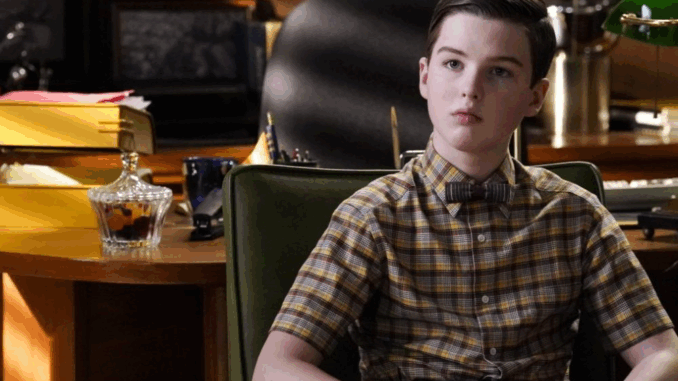
In a show about a child genius, one of the most complex and emotionally rich characters wasn’t a scientist, a teacher, or a fellow intellectual — it was his mother. Mary Cooper, portrayed masterfully by Zoe Perry in Young Sheldon, became a cornerstone of the show’s emotional and moral core.
She wasn’t just Sheldon’s mother. She was a Texan woman of fierce faith, deep love, and impossible choices. And as the show drew to a close after seven heartfelt seasons, fans were left with a richer, more human understanding of a character once seen as a rigid stereotype in The Big Bang Theory.
🙏 A Mother of Faith and Fire
Mary Cooper entered the screen with an identity shaped by two major forces: motherhood and religion. Living in a conservative East Texas town and married to a high school football coach, Mary’s life was modest, familiar — until one of her children turned out to be a once-in-a-generation genius.
Her deep Christian faith was a moral compass throughout the show. But rather than portraying her religion as comedic or outdated, Young Sheldon allowed it to be layered and sincere. Mary’s prayers were heartfelt. Her belief in God was unshakable. And when her world fractured — through poverty, parenting challenges, and ultimately grief — faith was her refuge.
However, this devotion often put her at odds with Sheldon’s scientific mind. Their constant push-and-pull formed the philosophical heart of the series, showing how love can exist between two people who view the universe in entirely different ways.
💬 The Battle Between Logic and Belief
One of Young Sheldon‘s most poignant threads was the intellectual and emotional clash between Mary and her gifted son.
Sheldon, a boy obsessed with data and certainty, often dismissed Mary’s spiritual beliefs as foolish. Mary, in turn, struggled to accept her son’s atheism and arrogance. But despite their many disagreements, there was a deep and unspoken understanding between them.
In one standout episode, Mary says to Sheldon: “I don’t need you to believe what I believe. I just need you to respect that I believe it.” It was a powerful moment that encapsulated her wisdom and strength — and a rare moment of compromise in a show where both science and faith were given weight.
👩👧 Torn Between Her Children

While Mary’s love for Sheldon often defined her role, it came at a price. Her relationships with her other children, Georgie and Missy, were far more strained.
Missy, in particular, felt like the forgotten child — independent, emotionally intuitive, and constantly craving her mother’s attention. Their dynamic ranged from tender to explosive. Mary tried to control Missy’s growing rebellion with stricter rules and moral expectations, only to push her further away.
But beneath the friction lay a deeper fear: Mary saw herself in Missy. The defiance, the fire, the refusal to conform. It was both threatening and familiar.
Georgie, the eldest, was largely left to navigate adulthood alone. When he became a teenage father, Mary’s disapproval clashed with her maternal instincts, creating some of the show’s most emotionally raw scenes.
💔 The Aftermath of Loss
Mary’s world crumbled in Season 7 with the sudden death of her husband, George Cooper Sr. While viewers of The Big Bang Theory always knew this moment would come, Young Sheldon portrayed it with staggering emotional depth.
Mary’s grief was not gentle. It was volcanic.
She retreated into faith with new fervor, attending church daily, and surrounding herself with religious community members. But inside the Cooper home, her sadness turned to rigidity. Her once warm demeanor hardened into bitterness. Her relationships with her children suffered. Even Sheldon, now emotionally maturing, began to notice how grief had changed his mother.
Yet through it all, Mary remained standing — a testament to the strength of women who carry their families through storm after storm.
🎭 Zoe Perry’s Subtle Brilliance
Much of Mary Cooper’s success as a character lies in the performance of Zoe Perry, daughter of Emmy-winning actress Laurie Metcalf, who originally played Mary in The Big Bang Theory.
Rather than imitating her mother’s performance, Perry created a younger, more hopeful, and more vulnerable Mary. She brought warmth, frustration, wit, and resilience to the screen in a way that felt grounded and genuine. Her portrayal earned praise for capturing the pain and power of everyday motherhood in a deeply complex family.
🌟 A Legacy Beyond Stereotypes
In The Big Bang Theory, Mary was a recurring comic presence — a stereotypical Bible Belt mom clashing with her genius son. But Young Sheldon redefined her. It gave her voice, agency, and flaws. It showed her struggles, doubts, and private breakdowns.
By the end of Young Sheldon, Mary Cooper wasn’t just the religious mother of a genius. She was a layered, broken, healing woman trying to do right by her family in an impossible world.
And for many viewers — especially mothers — she was the most relatable character of all.
